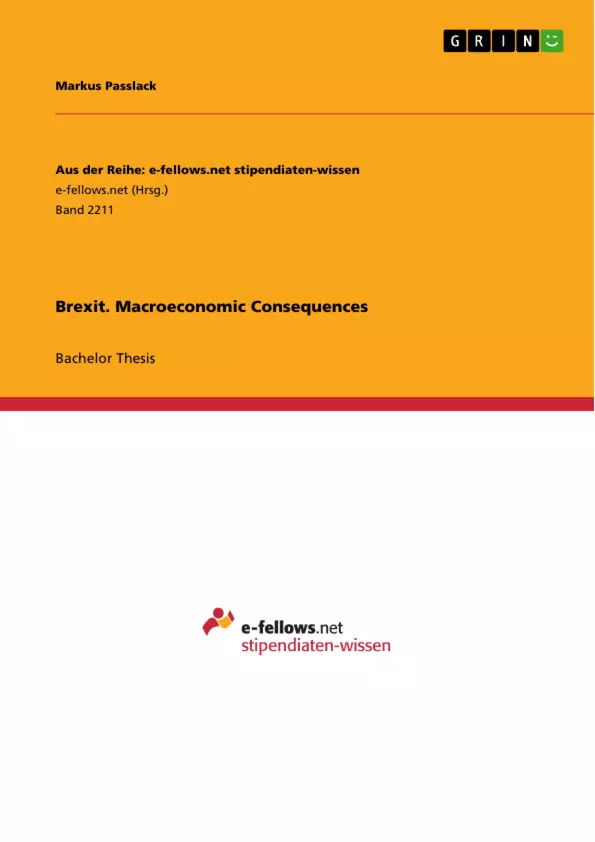The possibility the UK might leave the European Union infamously known as Brexit– is a major source of concern. The probability of the UK leaving the EU significantly rose after the referendum on 23. June 2016. This Bachelor Thesis seeks to assess the macroeconomic consequences of Brexit on the UK’s, Germany’s and other major european country’s economies. Despite the heaviest awareness that it is difficult to properly quantify the costs of uncertainty over Brexit, this work provides evidence that the severity of Brexit’ impact was not uniform across the investigated countries. The first part will elaborate the juristic consequences of the referendum and the potential resulting scenarios, while the second part will present the various options Britain has outside of the EU. The last big block will focus on the consequences of the Brexit for the UK, Germany and the rest of the EU.
Inhaltsverzeichnis (Table of Contents)
- Introduction
- State of Research
- The History of Brexit
- Juristic consequences of the Referendum
- Scenarios
- Best Case Scenario
- Most Probable Scenario
- Worst Case Scenario
- Possible Options for Britain after the Brexit
- The UK remains within the existing treaties
- The UK remains following a treaty change
- The Norwegian Model [EEA & EFTA]
- The Swiss Model [Bilateral Treaties & EFTA]
- The Turkish Model [EUCU]
- Free trade respectively association agreement
- A more international approach [USA/Canada/WTO]
- Unilateral adoption of WTO governed trade
- Transatlantic Free Trade [TTIP]
- Free Trade among the Commonwealth countries
- Consequences for Britain
- Quantifiable Consequences
- Not quantifiable Consequences
- Consequences in the short term
- Consequences in the long term
- Consequences for affiliated nations and territories
- Consequences for Scotland
- Consequences for Gibraltar
- Consequences for (Northern-) Ireland
- Consequences for the Rest European Union
- Consequences for Germany
- Outlook: Grexit and other potential exit candidates
Zielsetzung und Themenschwerpunkte (Objectives and Key Themes)
This Bachelor Thesis analyzes the macroeconomic consequences of Brexit on the UK, Germany, and other major European economies. The primary objective is to evaluate the potential economic impact of the UK leaving the EU, focusing on the various scenarios and consequences for different stakeholders.
- The potential economic consequences of Brexit for the UK, Germany, and other European countries.
- The different scenarios of Brexit and the options available to the UK after leaving the EU.
- The impact of uncertainty related to Brexit on economic stability and growth.
- The analysis of quantifiable and non-quantifiable consequences of Brexit.
- The potential effects on affiliated nations and territories within the UK, such as Scotland, Gibraltar, and Northern Ireland.
Zusammenfassung der Kapitel (Chapter Summaries)
- Introduction: This chapter introduces the topic of Brexit and highlights its significance as a major source of concern for global economies. It sets the stage for the thesis by outlining the research objective and the importance of assessing the potential macroeconomic impact of Brexit.
- State of Research: This chapter provides a summary of existing research on Brexit and its economic implications. It reviews relevant literature and discusses the different perspectives on the potential consequences of the UK leaving the EU.
- The History of Brexit: This chapter traces the historical context of Brexit, discussing the key events and factors that led to the UK's decision to leave the EU. It provides a historical overview of the UK's relationship with the EU and the political and economic considerations that shaped the Brexit referendum.
- Juristic consequences of the Referendum: This chapter examines the legal implications of the Brexit referendum and explores the potential scenarios that could unfold as the UK negotiates its exit from the EU. It analyzes the legal framework governing the UK's withdrawal and the complexities involved in disentangling from the EU's legal system.
- Scenarios: This chapter presents three different scenarios of Brexit, each with its own implications for the UK and the EU. It analyzes the economic and political consequences of each scenario and provides insights into the potential outcomes of different negotiation strategies.
- Possible Options for Britain after the Brexit: This chapter explores various options for the UK after leaving the EU. It discusses different models of cooperation and trade agreements that the UK could pursue, considering factors like access to the Single Market and the role of the World Trade Organization (WTO).
- Consequences for Britain: This chapter focuses on the specific economic consequences of Brexit for the UK. It analyzes both quantifiable and non-quantifiable impacts, considering the potential changes in trade, investment, and economic growth. This chapter examines the short-term and long-term consequences of Brexit for the UK economy.
- Consequences for affiliated nations and territories: This chapter investigates the potential consequences of Brexit for Scotland, Gibraltar, and Northern Ireland. It analyzes the unique challenges and opportunities that these regions might face as a result of the UK's exit from the EU.
- Consequences for the Rest European Union: This chapter explores the potential consequences of Brexit for the remaining EU member states. It examines the impact on trade, economic growth, and political stability within the EU. This chapter assesses the potential for spillover effects and the implications for the future of the EU project.
- Consequences for Germany: This chapter focuses on the specific consequences of Brexit for Germany. It analyzes the potential economic and political impact on Germany, considering factors such as trade relations, investment, and political cooperation.
Schlüsselwörter (Keywords)
The main focus of this thesis is on the economic consequences of Brexit, examining the potential impact on the UK, Germany, and other European countries. The key themes include the legal implications of the referendum, various scenarios and options for the UK after leaving the EU, trade agreements, economic growth, and the potential for uncertainty and volatility.
- Citation du texte
- Markus Passlack (Auteur), 2016, Brexit. Macroeconomic Consequences, Munich, GRIN Verlag, https://www.grin.com/document/345023



